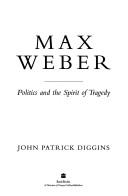Check nearby libraries
Buy this book

Ever since World War II, Max Weber has been regarded as a monument to the most conservative and conventional orthodoxies of the social science establishment. Despite the fact that many of Weber's books, foremost among them, Economy and Society and The Protestant Ethic and the Spirit of Capitalism, are classics and continue to be read, there has never been a single-volume treatment of Weber's life and thought in English.
In reversing this critical neglect, John Patrick Diggins challenges Weber's iconic status and in the process uncovers another side of Weber: one influenced by Nietzsche, one whose deep belief in individualism bound him close to the Emersonian tradition in America, one with a Lincoln-like sense of history as tragedy, and one with a sober sense of the responsibilities of the state.
Diggins brilliantly connects the critical moments of Weber's life - and in particular, his experience of America - to his most enduring ideas on power, capitalism, bureaucracy, and science. He argues that Weber's emphasis on such topics as rapaciousness, hypocrisy, and deception makes his work timelier than ever in helping to illuminate the dilemmas of modern American politics.
Check nearby libraries
Buy this book

Subjects
Philosophy, Methodology, 1864-1920, Social sciences, Biography, Social scientistsPeople
Max Weber, Max Weber (1864-1920)| Edition | Availability |
|---|---|
| 1 |
aaaa
|
| 2 |
zzzz
|
Book Details
Edition Notes
Includes bibliographical references (p. 287-317) and index.
6
Classifications
The Physical Object
ID Numbers
Community Reviews (0)
Feedback?| August 1, 2024 | Edited by MARC Bot | import existing book |
| February 28, 2020 | Edited by MARC Bot | remove fake subjects |
| July 14, 2017 | Edited by Mek | adding subject: Internet Archive Wishlist |
| April 28, 2010 | Edited by Open Library Bot | Linked existing covers to the work. |
| December 9, 2009 | Created by WorkBot | add works page |










